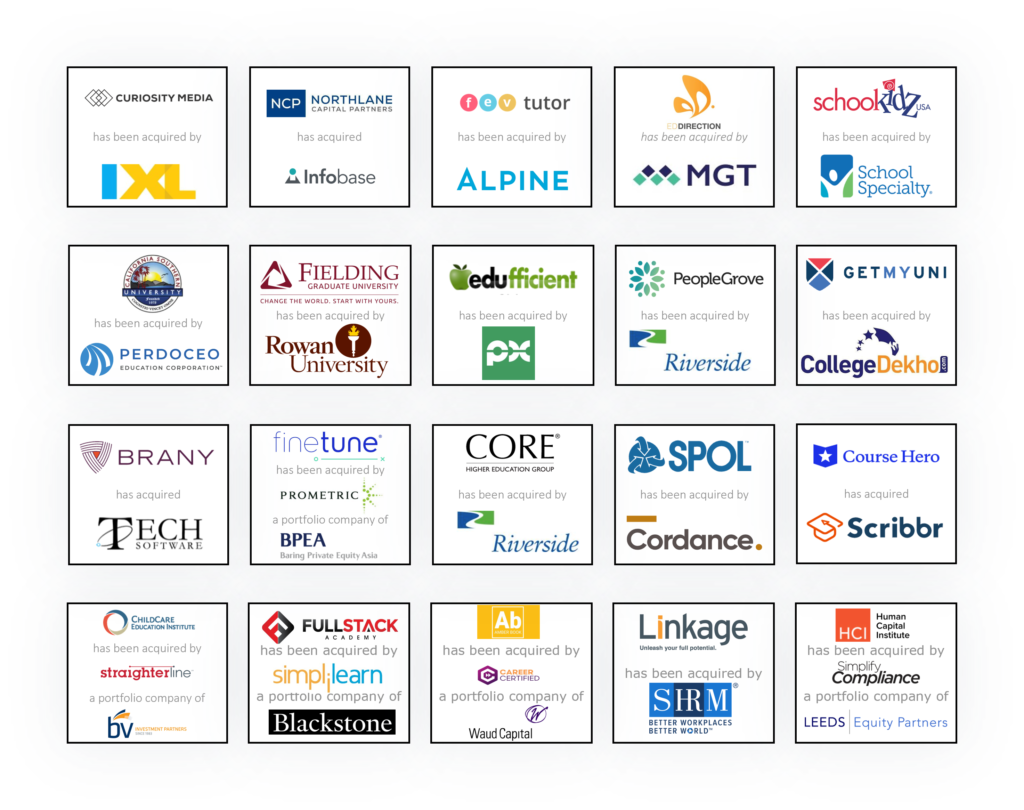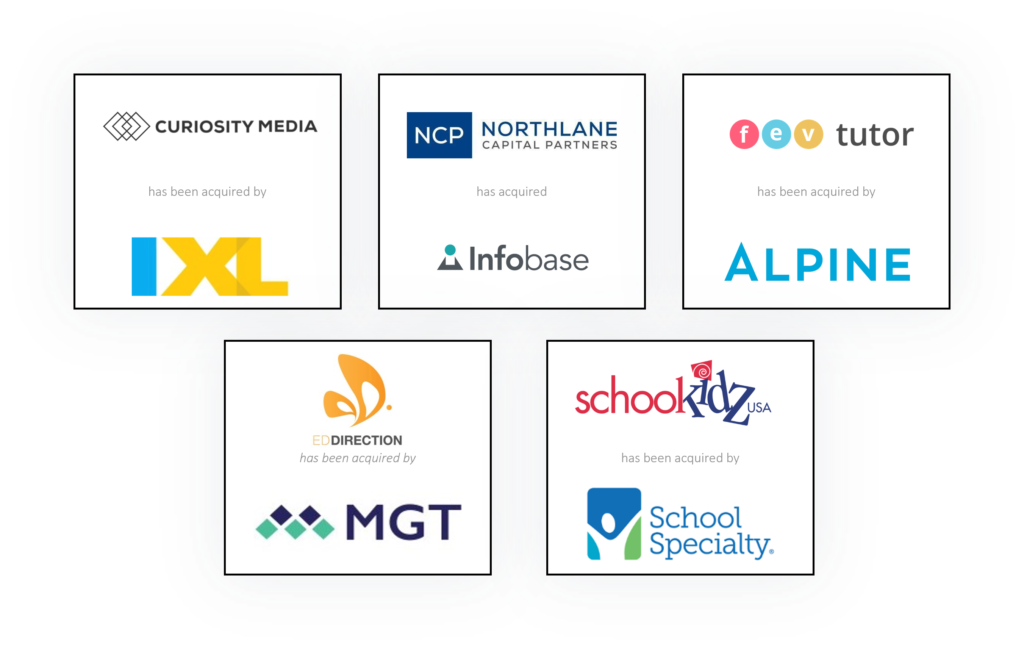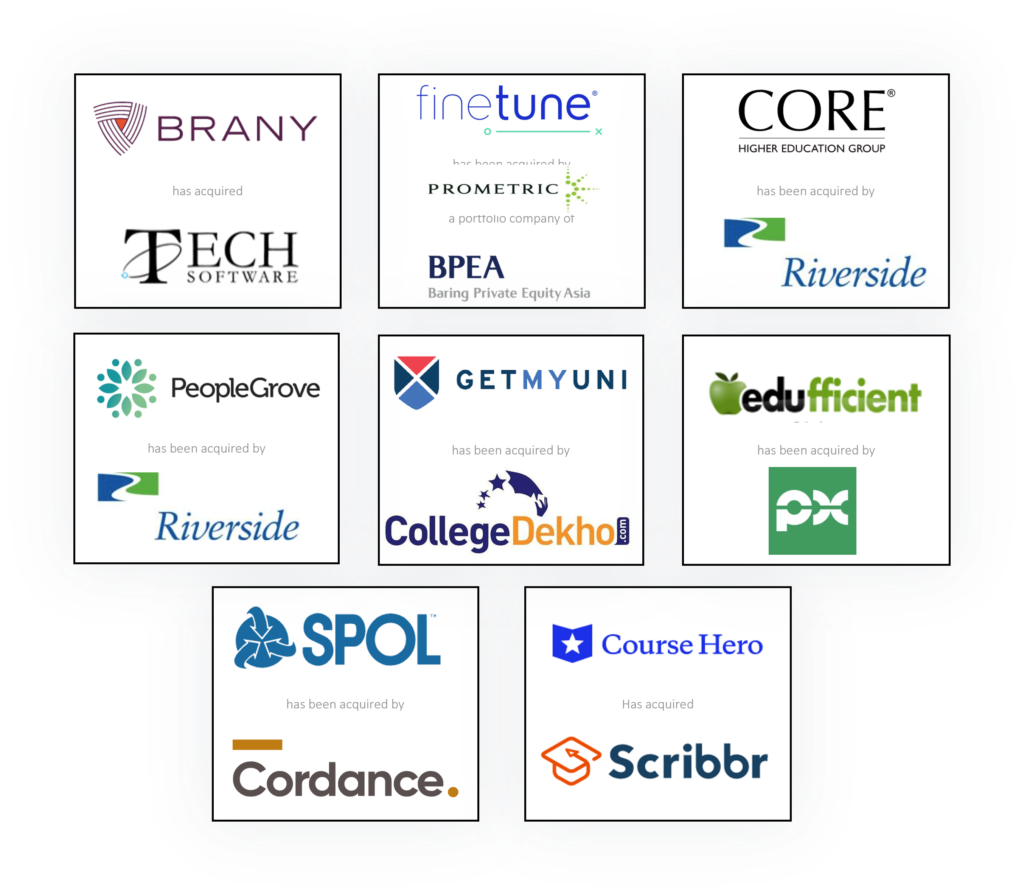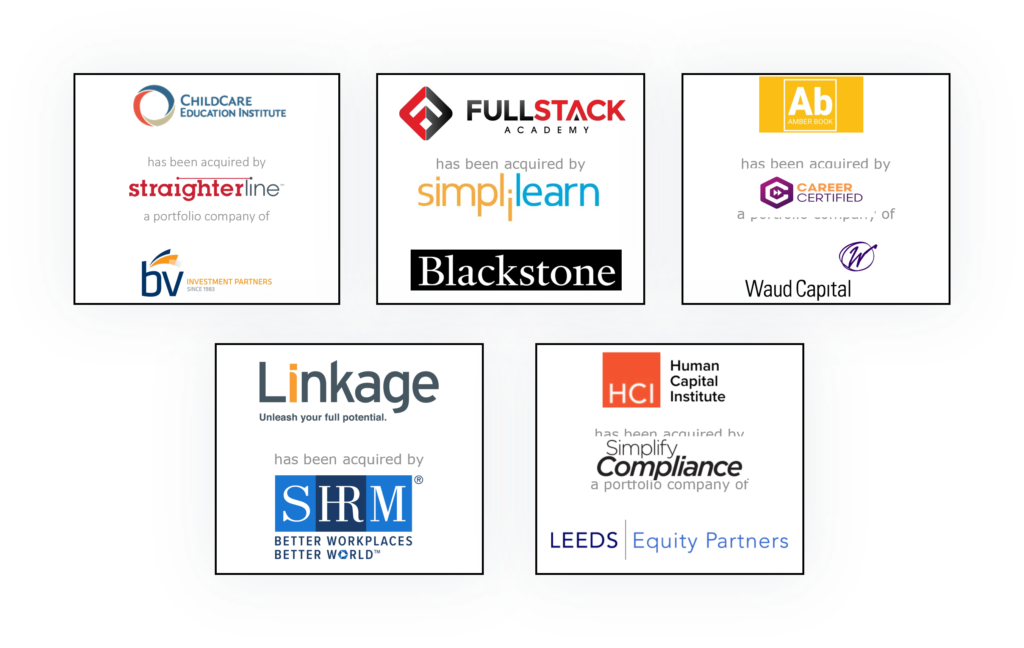Q1 2025 Deal Highlights & ASU+GSV 2025
April 3, 2025 Press ReleasesTyton Partners Closed Eight Q1 2025 Transactions Tyton Partners Delivers a Record Quarter Tyton Partners is proud to…

We are pleased to announce that Tyton Partners Investment Banking Division has completed a record number of transactions in 2022, with 24 deals completed across the PreK-12, Higher Education Technology and Services, Post-Secondary Institutions, and Corporate L&D and Staffing markets. Despite the global dealmaking slump for mega buyouts, equity issuances and IPOs, and the continued risk of heightened inflation and higher interest rates, the current macroeconomic market conditions remain supportive for M&A in the lower middle market. A wide range of investors are seeking to de-risk and diversify, corporate divestitures have increased significantly, and VC firms have become more restrictive, which will drive select M&A opportunities across investor portfolios. Some of the factors influencing this accommodating environment are the following:
We also believe that 2023 will bring more private sellers off the sidelines as pricing begins to stabilize, market volatility declines, and the debt markets become more accommodating to fuel traditional LBOs. Tyton Partners Investment Banking division enters 2023 with over 30 active engagements as we expect another robust growth year for the firm as we see significant pockets of opportunity across the global knowledge markets. In addition to North America, Tyton Partners continues to invest in broadening our coverage in emerging and international markets, as we continue to see compelling opportunities for edtech in India, Asia/Australia, Africa, and Latin America. These investments include targeted new hires in select markets and continuing our multi-year track record of driving significant amount of deal flow outside of North America. We believe our decades of transactional experience, deep sector and geographic knowledge of these markets will help our clients hedge their exposures and provide new opportunities to deploy capital, as these markets benefit from continued investment from governments, NGOs, and private investors seeking to improve the educational standards and outcomes amidst the economic uncertainty.
We look forward to discussing these trends and their impact on your business over Q1, supporting you in navigating the market shifts, determining where capital market’s compelling opportunities shall exist in 2023, and the identification of growth opportunities. Please reach out to us here to schedule a conversation.

The K-12 market remains a key area of focus for investors and strategics seeking opportunities that will address the shock of the pandemic to further stem learning loss; address critical teacher and staffing shortages; and provide schools, districts, and parents with the curricular and non-academic resources they need to improve student outcomes. Furthermore, ESSER funding from the federal government has bolstered many of these businesses as districts have additional resources to support novel solutions. Addressing these challenges remains top of mind, for parents, teachers, and district leaders, as the impact of the pandemic will be felt in K-12 for several years to come.
Tyton represented a wide range of K-12 companies addressing these needs, including: FEV Tutor, the largest school-based tutoring services provider, in its sale to Alpine Investors; Curiosity Media, a digital language learning curriculum provider, in its sale to IXL Learning; Northlane Capital Partners in its acquisition of Infobase, a digital content and software provider; EdDirections, a school turnaround consulting provider, in its sale to MGT; and SchoolKidz, a school kitting business, in its sale to School Specialty.

As colleges and universities continue to struggle to meet enrollment goals, address demographic shifts, prepare for an online/hybrid learning experience, and face financial hardships, there will be continued M&A activity and consolidation of solutions across the higher education student lifecycle. We believe that SaaS technology solutions, data and analytics providers that support institutional effectiveness, as well as AI and chatbots will be critical to addressing some of these institutional challenges. In addition, to support core technology solutions, colleges and universities require a layer of service provisioning to implement their technologies as well as outside services that address the market challenges to ensure their long-term success and viability.
Tyton represented several higher education technology companies supporting higher education institutions, including: FineTune Learning, an AI-based assessment provider, in its sale to Prometric, a portfolio company of Barings PE Asia; Coursehero in its acquisition of Scribbr, a plagiarism and writing tool provider; PeopleGrove, a mentoring and alumni management solution, in its sale to Riverside; Core Higher Education, an externship and clinical back-office management platform, in its sale to Riverside; SPOL, an institutional effectiveness solution, in its sale to Cordance; BRANY in its acquisition of TechSoftware, a research and IRB management solution; FF Ventures and Edufficient, a lead generation provider, in its sale to PX; and GetMyUni, an international lead generation provider, in its sale to CollegeDekho.

As employers and employees adjust to the post-pandemic work environment, there remains significant need for effectively training, managing, and recruiting human capital. The need for upskilling, reskilling, staffing, and workforce management remains top of mind for employers seeking to do more with less resources to ensure the retention and recruitment of top talent. Content, technology, and outsourced services will each play a distinct role in the ecosystem as we are seeing consolidation of these elements into a single solution for employers.
Tyton represented AmberBook, an architecture test prep provider, in its sale to Career Certified, a portfolio company of Waud Capital; the Childcare Education Institute (CCEI), an early childhood professional education provider, in its sale to Straighterline, a portfolio company of BV Partners; Fullstack Academy, a coding bootcamp provider, in its sale to Simplilearn, a portfolio company of the Blackstone Group; Linkage, a leadership development provider, in its sale to SHRM; and HCI, a HR training provider, in its sale to Simplify Compliance, a portfolio Company of Leeds Equity.

As colleges and universities continue to face financial hardships, we have seen an uptick in the number of closures, sales, and/or mergers of post-secondary institutions. We have seen interest in post-secondary institutions in the U.S. from consolidation platforms that are seeking innovative programs, online capabilities, and operational infrastructure as well as burgeoning interest from investor groups outside of the U.S.
Tyton represented Fielding Graduate University, a leading psychology and education graduate school, in its sale to Rowan Global; and California Southern University, a leading adult-focused doctoral institution, in its sale to Perdoceo.
We believe that India and Africa continue to represent massive emerging market opportunities for edtech investments in 2023, as they have the combination of pervasive need for education across K-12, Post-Secondary, and Corporate L&D and Staffing markets; significant populations of learners at all levels; and strong downward pricing pressure on products and services relative to other emerging markets. In addition, the dismantling of the China edtech ecosystem creates an opportunity for investments in Asia as many edtech business have shifted to neighboring regional countries to continue operations.
The India edtech market is expected to grow to more than $300B by 2030 with 5 million incremental jobs created impacting over 400 million leaners. Over the last five years, capital inflows have increased substantially for Indian edtech venture to growth companies, correlating with massive cohorts of early-stage platforms evolving into growth stage, commercially viable, investment grade targets. The edtech and knowledge service markets has followed the same evolutionary trends witnessed 10 years ago in the U.S. market as there is a need for quantifying learning outcomes, benchmarking program and degree completion while demonstrating contextual skills or knowledge attainment, and analytics to support educational institutional improvements.
Simultaneously while significant capital has flowed into India, the product and/or subscription price points are subscale (or expected to be free/freemium) juxtaposed with other emerging markets. These trends indicate that India is entering a phase of educational product and service price and utility value “flight to quality” in both the B2C and B2I (schools/institutions) markets while maintaining severe pricing restrictions by nature of the economy and socio-economic ceilings. These trends will lead many of the large, overcapitalized platforms to look to rebalance in 2023 and seek North American based M&A as a hedge to price constrictions and unit economic barriers in country. India will also remain a primary locale for high quality tutoring, coaching, and mentoring labor supply in anglophile and G7 country markets.
Africa also represents a vast market opportunity with a projected $57B ed tech spend in Africa by 2030. The African education ecosystem is fraught with challenges as 85% of Africans under the age of 15 are not literacy and numeracy proficient coupled with significant teacher shortages leading to 9.4% post-secondary education participation compared to 38% globally. Further compounding the problem is the skills gap as more than 95% of CEOs in Africa are concerned about the lack of requisite skills among prospective employees with 65% of them citing that the skills shortage is preventing them from innovating effectively. These basic education and technical skill gaps provide a fertile ground for investments to support core infrastructure, new school developments, educational technology delivery, teacher professional development, and the digital skills attainment that can be exported from North America and other anglophile markets to accelerate the pace of change for learners across the ecosystem.
We believe that 2023 will also be a strong year for the leading edtech markets in Asia that are continuing to transition away from China to the benefit of Singapore South Korea, and others. Following the dismantling of the for-profit education ecosystem that had developed over the last decade in China, due to new restrictions on for-profit education operators, regulatory impairments, and the scrutiny of profitmaking edtech companies across the country. Physical plant assets, operations, IP, and capital have transitioned in droves to Singapore, South Korea, and other countries, or shuttered in large-scale bankruptcies.
The magnitude of the market opportunity in primarily India and Africa as well as the shift away from China will drive compelling growth and investment opportunities in the global emerging edtech market in 2023.